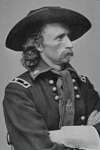George Armstrong Custer
 George Armstrong Custer was born in the Mid-Western State of Ohio on the 5th December 1839 at New Rumley, one of the many settlements spread across the Continent.
George Armstrong Custer was born in the Mid-Western State of Ohio on the 5th December 1839 at New Rumley, one of the many settlements spread across the Continent.
Custer's great-uncle Jacob founded New Rumley in 1812, the Custers were Farmers of German stock who had settled in Pennsylvania, and then to Maryland where George's Father Emanuel was born in 1806 and moved to New Rumley when Emanuel was a young man.
George's Father, by all accounts, was a good-humoured jovial man of large proportions. A staunch Democrat, he prided himself on being self-sufficient. A firm Methodist with strong views on the evils of liquor, tobacco and gambling. He had even helped to found the Methodist Church there. In 1828 Emanuel married the first of his wives but who died six years later (1834) having bore him three Children. In 1837 he married Maria Ward Kilpatrick, a Widow with children of her own living in New Rumley.
The first two children she bore him died in infancy, George the third child was obviously of sterner stuff and his father doted on him taking him, when he was four years old to Militia meetings (the New Rumley Invincibles), George dressed in a brass-buttoned velvet suit (sound familiar), would march up and down behind the Militia.
The Custer clan was large even by 19th Century standards, the house was always full of noise and his father loved playing practical jokes, a trait which Autie (as George was nick-named) shares.
When Autie was ten years old he was sent to stay with his married stepsister Anne (Reed) in Monroe, Michigan, in order to attend the Stebbins Academy, which offered the best education at that time.
Monroe was a quiet country town on the shore of Lake Erie (named after and earlier President) and as far as I know no relationship to my family, but you never know! He did well at his lessons, but was more interested in sports, trying his hand at Wrestling, which he was good at, and running. At the age of fourteen he attended the local Seminary and was considering a career in the Military, and hoped to go to West Point but did not have the backing of a sponsor or the finances to enable him to do so.
His second choice of career was as a teacher, which he undertook at the small village school of Beech Point Monroe, and was popular with his pupils.
Around this time Autie fell in love with Mary Holland (the daughter of his Landlord) and sent her letters and poems asking her to marry him. Unfortunately her father was against it, and because of this probably decided to sponsor Autie's attendance at West Point along with the help of their local Congressman John Bingham, and in 1857 Autie set off for the United States Military Academy on the Judson River in New York State. In order to raise the money, Emanuel Custer had sold the farm.
108 boys took the entrance exam, only 68 passed - Autie was one of them. Any ex-soldiers will remember what basic training was like and so it was for Autie (only worse), ahead of him was years of endless studying, mathematics, tactics, drill and dress parades. In the summer there were encampments where the Cadets would practice what they had learned! The instructors ruled the Academy with an iron fist. (Someone described the place as Legalised Despotism), but on passing out the cadets knew they would be treated as America's Elite.
George was always in trouble with his instructors, talking on parade, scruffy uniform, gambling in quarters idle at drill, and often punished with extra guard duties.
At this time events were unfolding, the Civil War was looming ever closer. In the autumn of 1860 the topic of conversation among the Cadets was the impending spectre of war between the North and South.
The cadets from the South left one by one, Autie was in trouble as usual. He was arrested and Court Martialled for not stopping a fight between two cadets while on duty as Officer of the Guard, and could only watch from the guardhouse as his classmates marched off to the war. Speaking on his behalf, his friends had his court-martial postponed and Second Lieutenant George Armstrong Custer rushed off to war, stopping in New York long enough to buy his uniform and equipment.
His exploits between 1861 and the 1870's are well documented and I will leave the reader to form his/her own opinion of the man, the soldier and his (LUCK?).
Pvt. S C Munro, Bty. B. 2nd US Artillery
The above article first appeared in the ACWS Newsletter, December 1999
